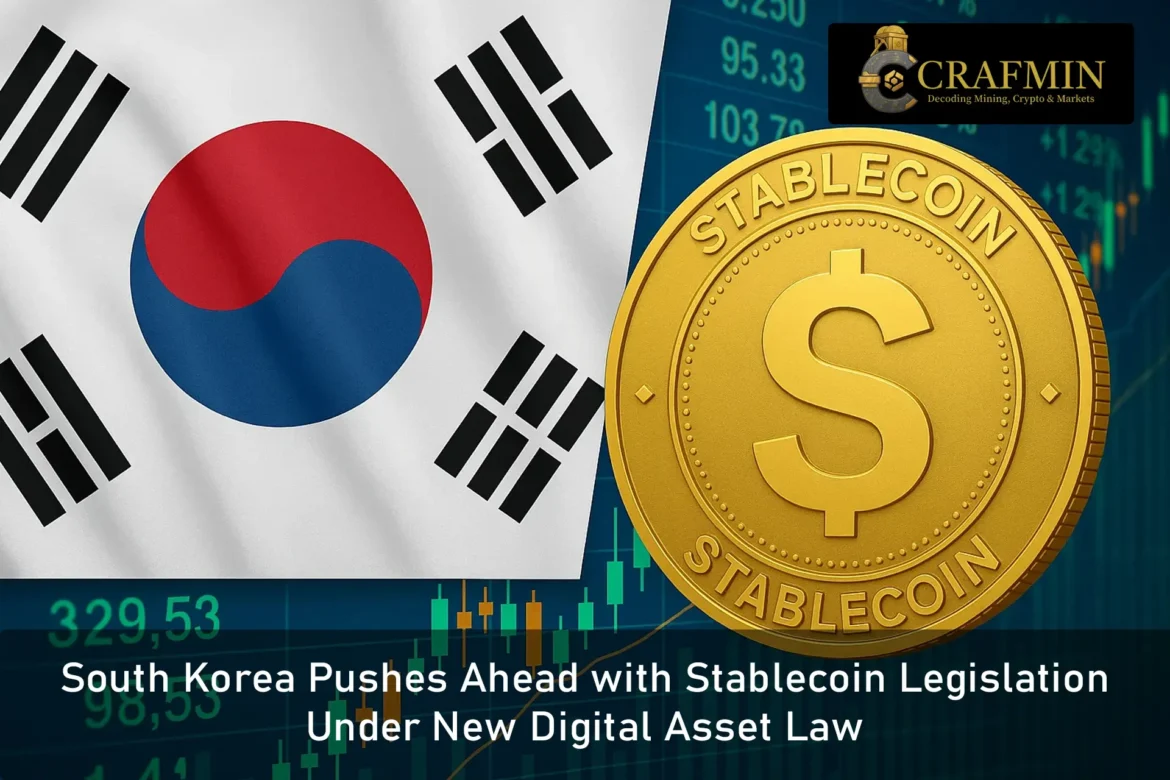South Korea is taking a major step towards regulating digital finance. The ruling Democratic Party has introduced a draft bill that would legalise the issuance of stablecoins backed by the Korean won. This initiative is part of the broader Digital Asset Basic Act and has already sparked significant interest from both financial institutions and the crypto community.
If approved, the legislation would establish a rigorous framework for the domestic issuance of stablecoins, requiring issuers to maintain a minimum equity threshold of ₩500 million (about AUD $562,000), ensure full reserves backing the coins, and secure formal approval from the Financial Services Commission (FSC).
This bold move could reshape South Korea’s position in the global crypto space, offering both structure and opportunity.

South Korea Advances Stablecoin Regulations with New Digital Asset Law ( Image Source: Coinpedia )
Why the Timing Matters
The proposal aligns closely with President Lee Jae-myung’s campaign pledge to promote a “transparent, inclusive” crypto economy. His administration has made it clear that innovation in digital assets must go hand-in-hand with responsible oversight.
The urgency is evident: during Q1 alone, roughly ₩57 trillion (AUD $64 billion) in USD-pegged stablecoins were traded across just five domestic platforms. Yet despite the volume, no clear legal framework exists for stablecoins—until now.
The bill seeks to reverse capital flight by supporting local, won-pegged tokens and ensuring South Korea can compete globally as a hub for digital asset innovation.
Inside the Digital Asset Basic Act: Key Measures
The bill introduces a robust, rules-based system to protect both issuers and investors. The major provisions include:
- Minimum Equity Requirement: Issuers must hold ₩500 million in equity to obtain a licence.
- Full Reserve Backing: Every issued won-pegged stablecoin must be fully backed by equivalent reserves.
- Insolvency Protection: Reserves will be held separately from the issuer’s assets to safeguard users if the firm goes bankrupt.
- Regulatory Approval: The FSC will oversee and approve all stablecoin products before they enter the market.
- Digital Asset Committee: A presidential advisory body will guide national crypto strategy and coordination.
The overall aim is to increase institutional confidence, foster responsible innovation, and protect everyday investors.
Market Reaction: Optimism and Momentum
The announcement has energised the crypto space. Shares in blockchain-focused firms such as KakaoPay have jumped, and Kakao’s blockchain division has already signalled plans to launch a won-backed stablecoin.
Industry stakeholders have praised the move, viewing it as a sign that South Korea is ready to become a stablecoin leader. Over 60% of local businesses are reportedly exploring blockchain integration, encouraged by this anticipated regulatory clarity.
South Korea may soon allow companies to issue stablecoins under a new bill. A big move for Asia’s crypto future! #CryptoNews #Stablecoin #SouthKoreahttps://t.co/NguObnREQ9
— CoinoMedia (@coinomedia) June 10, 2025
Pushback from the Bank of Korea
Not everyone is on board. The Bank of Korea (BoK) has raised red flags, warning that privately issued stablecoins could undermine monetary policy and financial stability if left unchecked.
BoK officials are lobbying for the authority to audit reserve assets and oversee stablecoin operations directly—particularly as such tokens start to play a larger role in the payments landscape.
This could create friction between the BoK and the FSC, each vying to shape the country’s digital finance future.
Also Read: Apple in the AI Race: Is Siri Slowing Down the Innovation Engine?
Terra’s Legacy and Lessons Learned
South Korea’s crypto regulation efforts have been shaped by the memory of TerraUSD’s collapse. Created by South Korean entrepreneur Do Kwon, the algorithmic stablecoin’s failure erased billions from the market and left regulatory scars.
Determined to avoid repeating the same mistake, lawmakers are drawing a hard line between algorithmic models and fiat-backed coins. The new bill mandates full reserves and capital minimums, clearly distinguishing it from Terra’s failed structure.
Joining a Global Regulatory Shift
South Korea’s initiative is part of a broader international movement. Hong Kong is advancing its own stablecoin legislation, and multiple U.S. proposals seek to bring similar assets under federal supervision.
In this landscape, South Korea’s bill could serve as a benchmark—particularly within the Asia-Pacific region—for how to strike the right balance between innovation and regulation.
What Lies Ahead
The bill has been introduced and will now face parliamentary scrutiny. Although timelines are not fixed, the Democratic Party’s legislative control makes passage highly likely. The months ahead will likely involve:
- Legislative Debate: Fine-tuning provisions, especially regarding the Bank of Korea’s role.
- Issuance Framework: The FSC will develop detailed licensing and compliance guidelines.
- Early Market Entrants: Players like Kakao, Naver, and Shinhan Bank may lead the initial rollout.
- Public Awareness Campaigns: Education initiatives will aim to inform users and curb misinformation.
Final Thoughts
South Korea’s decision to formalise stablecoin issuance through the Digital Asset Basic Act marks a pivotal moment. With strong safeguards and institutional oversight, the country is laying the groundwork for a future-proof crypto ecosystem.
By focusing on transparency, real-world backing, and responsible governance, South Korea isn’t just regulating digital currencies—it’s reimagining how finance can work in a decentralised age.
Whether you’re deep into crypto or just starting to explore, one thing is clear: South Korea’s legislative move could set a global precedent for stablecoin innovation done right.

